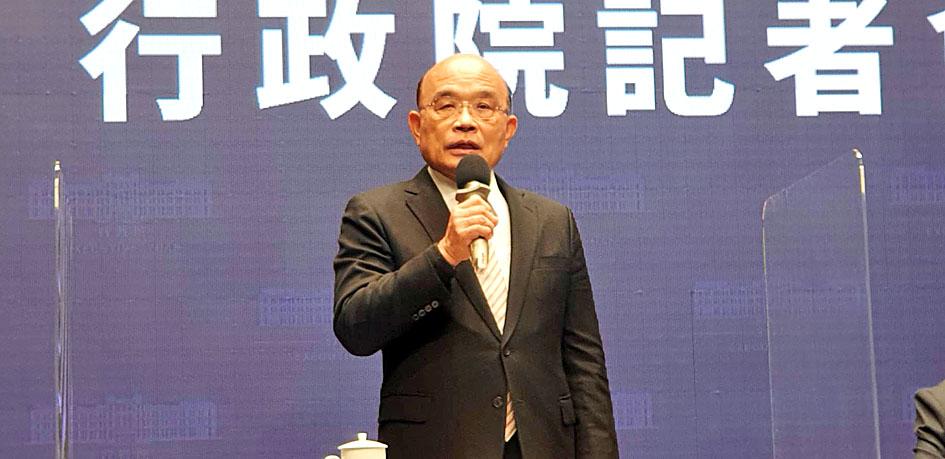The Executive Yuan yesterday approved amendments to toughen sanctions against economic spies working for China or other foreign nations.
Premier Su Tseng-chang (蘇貞昌) told a Cabinet meeting that China in the past few years has intensified its “red supply chain” infiltration of industries in Taiwan.
Chinese firms are attracting high-tech talent from Taiwan and stealing “core” technologies, Su said.

Photo: Lee Hsin-fang, Taipei Times
As a result, it is necessary to establish stricter regulations and a more robust national security policy to protect such technologies, he said.
The proposed amendments to the National Security Act (國家安全法) stipulate that anyone who steals Taiwan’s core technologies or trade secrets to give them to China or other hostile foreign forces would face five to 12 years in prison, and be fined NT$50 million to NT$100 million (US$1.79 million to US$3.59 million).
Those who give their own trade secrets of Taiwan’s core technologies to China, including Hong Kong and Macau, or other foreign jurisdictions would face up to 10 years in prison and a fine of up to NT$50 million, the proposed amendments say.
Draft amendments to the Act Governing Relations Between the People of the Taiwan Area and the Mainland Area (兩岸人民關係條例) say that individuals or members of organizations that receive government subsidies for work on national core technologies must report to the government and secure approval if they want to travel to China less than three years after working on government-sponsored projects.
Such people who travel to China without securing prior approval would face a fine of up to NT$10 million, the draft amendments say.
The proposed changes to the National Security Act are necessary, as they offer two more layers of protection to prevent Taiwan’s core technologies from being illegally obtained by foreign hostile forces, complimenting protections in the Trade Secrets Act (營業秘密法), the Ministry of Justice said.
The Intellectual Property and Commercial Court and the Taiwan High Court are to have jurisdiction over cases of economic spying and extraterritorial use of core technologies, the ministry said.
Department of Prosecutorial Affairs Director-General Lin Jinn-tsun (林錦村) said that core technologies are those that are regulated by the government to uphold national defense and the safety of key infrastructure.
They also include leading technologies that have the potential to greatly elevate Taiwan’s global competitiveness, Lin said.
A list of core technologies is to be announced by the Executive Yuan, he said.
The proposed amendments need to be approved by the Legislative Yuan and promulgated by President Tsai Ing-wen (蔡英文) before they take effect.

AIR SUPPORT: The Ministry of National Defense thanked the US for the delivery, adding that it was an indicator of the White House’s commitment to the Taiwan Relations Act Deputy Minister of National Defense Po Horng-huei (柏鴻輝) and Representative to the US Alexander Yui on Friday attended a delivery ceremony for the first of Taiwan’s long-awaited 66 F-16C/D Block 70 jets at a Lockheed Martin Corp factory in Greenville, South Carolina. “We are so proud to be the global home of the F-16 and to support Taiwan’s air defense capabilities,” US Representative William Timmons wrote on X, alongside a photograph of Taiwanese and US officials at the event. The F-16C/D Block 70 jets Taiwan ordered have the same capabilities as aircraft that had been upgraded to F-16Vs. The batch of Lockheed Martin

GRIDLOCK: The National Fire Agency’s Special Search and Rescue team is on standby to travel to the countries to help out with the rescue effort A powerful earthquake rocked Myanmar and neighboring Thailand yesterday, killing at least three people in Bangkok and burying dozens when a high-rise building under construction collapsed. Footage shared on social media from Myanmar’s second-largest city showed widespread destruction, raising fears that many were trapped under the rubble or killed. The magnitude 7.7 earthquake, with an epicenter near Mandalay in Myanmar, struck at midday and was followed by a strong magnitude 6.4 aftershock. The extent of death, injury and destruction — especially in Myanmar, which is embroiled in a civil war and where information is tightly controlled at the best of times —

China's military today said it began joint army, navy and rocket force exercises around Taiwan to "serve as a stern warning and powerful deterrent against Taiwanese independence," calling President William Lai (賴清德) a "parasite." The exercises come after Lai called Beijing a "foreign hostile force" last month. More than 10 Chinese military ships approached close to Taiwan's 24 nautical mile (44.4km) contiguous zone this morning and Taiwan sent its own warships to respond, two senior Taiwanese officials said. Taiwan has not yet detected any live fire by the Chinese military so far, one of the officials said. The drills took place after US Secretary

THUGGISH BEHAVIOR: Encouraging people to report independence supporters is another intimidation tactic that threatens cross-strait peace, the state department said China setting up an online system for reporting “Taiwanese independence” advocates is an “irresponsible and reprehensible” act, a US government spokesperson said on Friday. “China’s call for private individuals to report on alleged ‘persecution or suppression’ by supposed ‘Taiwan independence henchmen and accomplices’ is irresponsible and reprehensible,” an unnamed US Department of State spokesperson told the Central News Agency in an e-mail. The move is part of Beijing’s “intimidation campaign” against Taiwan and its supporters, and is “threatening free speech around the world, destabilizing the Indo-Pacific region, and deliberately eroding the cross-strait status quo,” the spokesperson said. The Chinese Communist Party’s “threats